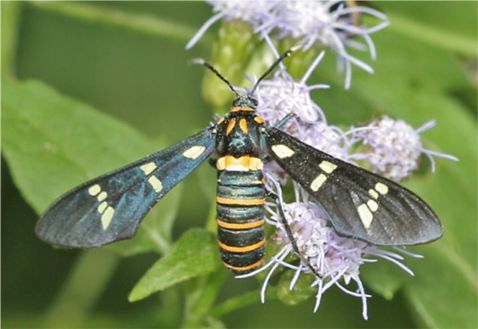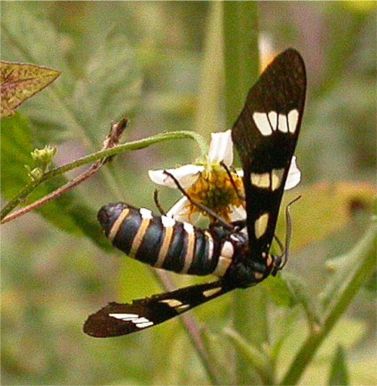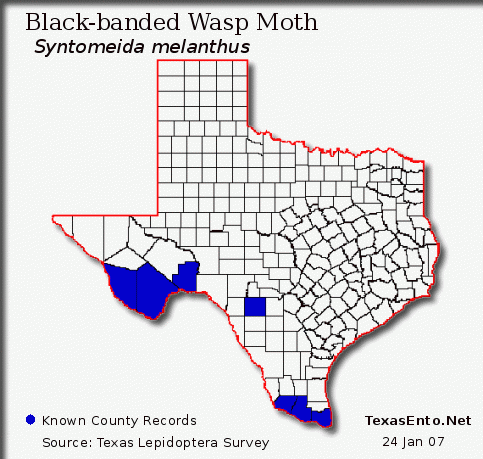Return
to Texas Entomology - Compiled by Mike
Quinn
Black-banded Wasp Moth
Syntomeida melanthus (Cramer, 1780)
Tiger Moth Family Arctiidae
(nectaring on Eupatorium odoratum -
Asteraceae)
nr. Falcon Heights, Starr County, Texas
26 November 2006 (J & S Hengeveld, P & J Kelly)
(Nectaring on Bidens pilosa -
Asteraceae)
Parque Ecológico Chipinque
Monterrey, Nuevo Leon, Mexico
9 September 2006 (M Quinn)
Texas County Records for Syntomeida melanthus
Range: Southwestern U.S., south to Central America
TEXAS: lower Rio Grande Valley, southern Edwards Plateau, Big Bend
ARIZONA: Santa Cruz County.
Recent Records:
TX: Starr Co., nr. Falcon Heights, 26 November 2006. J Hengeveld, S
Hengeveld
TX: Hidalgo Co., Bentsen-RGV St Pk, 10 November 2006, Josh Rose
TX: Starr Co., 28 October 2006, Gil Quintanilla
MX: N.L., Monterrey, Chipinque, 9 September 2006, Mike Quinn
TX: Uvalde Co., Concan. 7-15 September 2001, Greg Muise
TX: Brewster
Co., Big Bend NP,
Chisos Basin, 21 August 1995, Charles W. Bordelon, Jr.
Earlier (First U.S.?) records reported by Blanchard (1973):
"Big Bend Nat. Park, 21 specimens, all taken in the desert around the
Chisos Mountains,
from early April to late June, and from late August to early
October."
Note: Adults are both diurnal and nocturnal. (Knudson & Bordelon
2004)
Similar Species: Four species of Syntomeida reach the U.S.
Syntomeida ipomoeae (Harris, 1839)
Syntomeida melanthus (Cramer, 1780)
Syntomeida epilais (Walker, 1854)
Syntomeida hampsonii Barnes, 1904
Caterpillar Food Plants: Janzen & Hallwachs (2005) report 54 host
records, over half were:
Convolvulaceae - Morning Glory Family
Merremia dissecta
Ipomoea batatoides
Photos:
Adult: Syntomeida
melanthus - Ed Knudson
Larva: Syntomeida
melanthus - Janzen & Hallwachs
Biography: Pieter
Cramer - (1721-1776) - Wikipedia
References:
Blanchard A. 1973. Record
and illustration of some interesting moths flying in Texas (Sphingidae,
Ctenuchidae, Noctuidae, Notodontidae, Geometridae, Pyralidae, Cossidae). Journal
of the Lepidopterists' Society, 27(2): 103-9.
Conner, W.E , R. Boada, F.C. Schroeder., A. Gonzŕlez,
J. Meinwald, & T. Eisner. 2001. Chemical
defense: bestowal of a nuptial alkaloidal garment by a male moth upon its mate.
Proceedings of the National Academy of Sciences 97(26): 14406-14411.
Druce, H. 1884. Biologia
Centrali-Americana. Insecta. Lepidoptera-Heterocera. Volume I
. R.H. Porter,
London. Pl.
70, fig 25.
Janzen, D.H. & W. Hallwachs. 2005. Dynamic database for an inventory of
the macrocaterpillar fauna, and its food plants and parasitoids, of Area de
Conservacion Guanacaste (ACG), northwestern Costa Rica <http://janzen.sas.upenn.edu>.
Knudson, E. & C. Bordelon. 2004. Illustrated Checklist of the Lepidoptera
of the Lower Rio Grande Valley, TX. Vol. 2B : Macro-Moths. Texas Lepidoptera
Survey, Houston. xiv + 59 pp. 20 plates.
Knudson, E. & C. Bordelon. 2003. Illustrated Checklist of Big Bend
National Park. Publication 3. Texas Lepidoptera Survey, Houston. (treats 1300
species, 12 color plates).
Sanderford, M.V. 1992. Acoustic communication of the polka-dot wasp moth, Syntomeida
epilais Walker (Lepidoptera, Arctiidae, Ctenuchinae). Ph.D. dissertation,
Wake-Forest University, Winston-Salem, NC.
Walker, F. 1854. Lepidoptera Heterocera. in: List of the Specimens of
Lepidopterous Insects in the Collection of the British Museum. 1: 1-278
Yack, J, T.A. Timbers, W.E. Conner, A. Aniello, & F. Schroeder 2004.
Defensive Flocculent Emissions in a Tiger Moth Homoeocera stictosoma
(Arctiidae, Arctiinae). Journal of the Lepidopterists’ Society 58(3): 173-177.
11 Mar 2008
© Mike Quinn / mike.quinn@tpwd.state.tx.us
/ Texas Entomology / Texas
Lep Information


